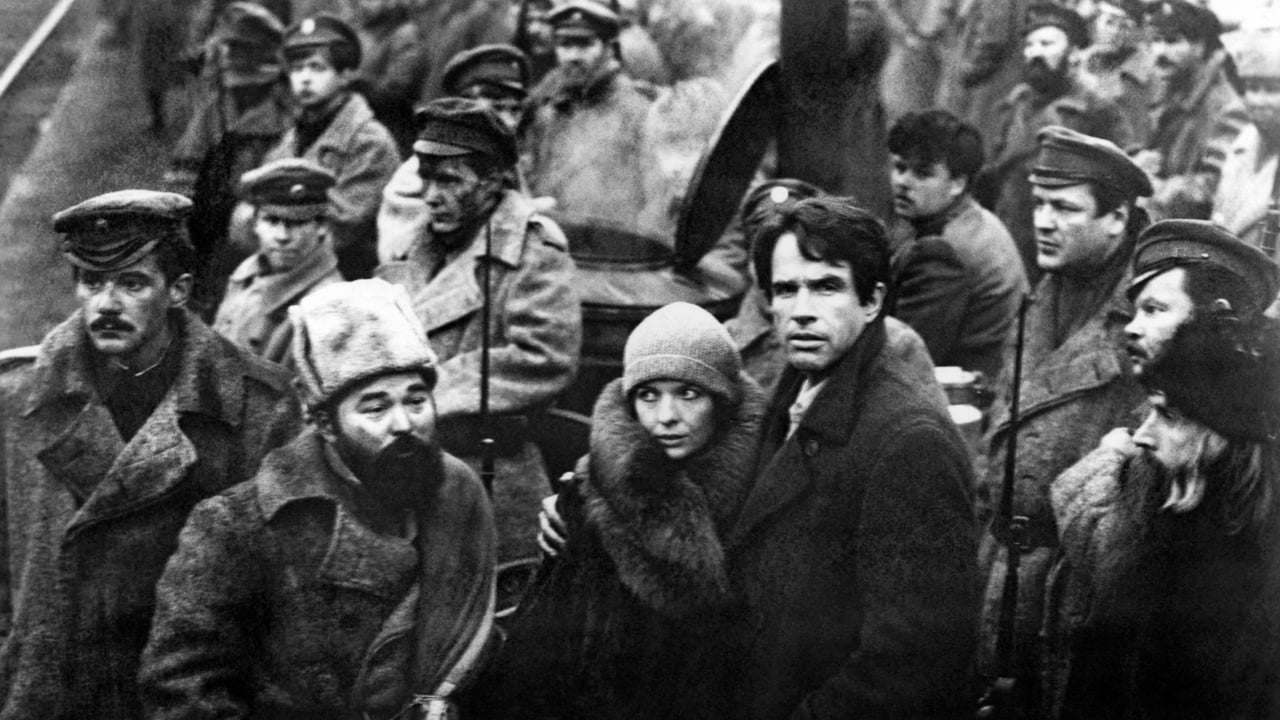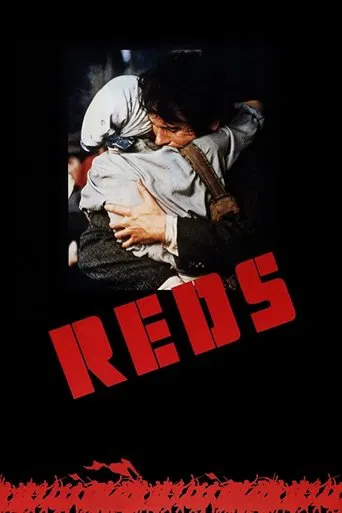

Based on the true story of Jack Reed (played by Warren Beatty) and Louise Bryant (Diane Keaton), two American socialists and writers. During WW1 they actively campaigned for and wrote about socialist causes. When the news of the Russian Revolution broke this was seen as the chance for socialism to gain a greater foothold and popularity. Reed went to Russia to see what could be learned from the revolution and took the ideas back to the US, forming the Communist Labor Party of America. Things weren't all plain-sailing though, both in the relationship between Reed and Bryant and in politics.Written and directed by Warren Beatty, the movie is really just a medium for Beatty to express his political views. And what misguided views they are! Ultra-left-wing, to the point of glorifying an incredibly reprehensible totalitarian regime.Before we even get to that, we have the background, setting out Reed and Bryant's relationship plus their politics. This is incredibly dull and padded, taking about 90 minutes for something that could have taken 15-30 minutes.The movie does pick up pace towards the end, but, as mentioned, not in a good direction.The ending is quite emotional, though to get to it you have to sit through a 190-or-so minute movie that could have been done in about 120 minutes.Despite the idealistic, misguided plot and extravagant (in terms of running time) direction, can't fault the performances. Beatty puts in a solid performance as Reed and Keaton is great as Bryant. Good supporting cast too: Jack Nicholson (as Eugene O'Neill), Paul Sorvino and Gene Hackman, among others.
... View MoreWarren Beatty's biographical saga about Jack Reed (1887-1920), a radical USA journalist, a fervent advocate of IWW (Industrial Workers of the World), and the author of TEN DAYS THAT SHOOK THE WORLD, running over 3 hours. REDS, scored 12 Oscar nominations (with 3 wins) and finally won Beatty an Oscar for BEST DIRECTOR among a combined 14 nominations throughout his eminent career so far (as actor, director, screen-writer and producer), undeniably can be reckoned as his most enterprising and taxing project, and is also notorious for its behind-the-scene stories such as Beatty's extravagant conceit in the director's chair and his off-screen romance with co-star Keaton (which ended right before the extended shooting days).Political elements aside, REDS quintessentially is an ode to the undying love between Jack Reed and his wife Louise Bryant (Keaton), also a radical journalist, since during most of its lengthy narrative, the latter is the unaltered focus of this epic and Beatty assiduously tells their relationship from her angle. Due to the similar political slant, they attract to each other almost instantly, when WWI edges to its end. But being labeled as an " exhibitionist" because of her feminist stance, Louise suffers from frustration to be taken seriously for her work as a writer and abetted by Jack's constant absence due to his job, she starts off a romance with Eugene O'Neill (Nicholson, who steals the limelight assertively with his trenchant dissection of their ménage à trois), the Nobel laureate playwright and their common friend, in spite of their vastly conflicting political standings. Things go downhill after they get married when monogamy stands in the way of their life, selfishly and immaturely Louise uses Eugene to get back at Jack, only to be taken aback by Jack's philandering notion of partnership.They separate for a while, until in 1917, the Bolshevik Revolution, becomes the essential catalyst of their undimmed love, witnessing the revolution in the front row, and realising what a sea change their Socialist belief can make in the war-trodden foreign land, they work shoulder-to-shoulder as comrades, write first-hand reports of the revolution and return to USA with an evolutionarily reshaped prospect of life, which is also where their political ideologies diverge.Jack passionately throws himself into politics, to bring Communism to his native soil, against the widespread fear that it would also usurp the democratic government of United States, whereas Louise hold a different opinion towards the issue, as she claims, she is deeply inspired by the Russian revolution and how proletariat can stand up and takes the regime, but she is also clear- minded about the fact that it is completely another situation for socialism to bloom here in America. Soon the schism emerges in the budding but vulnerable socialist party, their love is under another critical test when Jack defies Louise's advice and accepts the assignment to go to Moscow and seek endorsement from Grigory Zinoviev (acclaimed writer Kosinski in his first film role) for his party. His journey turns out to be a disaster, he is briefly incarcerated in Finland and then as an exchanged hostage, he stays with the communist party in Russia and stands for a mouthpiece of the socialism in USA, but soon grows increasingly disillusioned with Zinoviev's policies, meanwhile his health deteriorates drastically, a final reunion with Louise seems to be an immense mercy for him.Beatty painstakingly interposes interviews of more than thirty real-life "witnesses" who personally know Jack and Louise into the chronicle account, sometimes as a voice-over juxtaposing with the story, offering sound-bites and tidbits to enrich our perspectives of them and a larger social background at then. The documentary approach is quite risky, not only it adds considerable length to the already protracted magnitude, it also takes a chance with a more elaborate editing process in the post-production, how come it failed to nab the editing trophy in the Oscar?REDS received four acting nominations in four categories, firstly, Beatty is apparently too old for the role (Reed dies at the age of 33, while Beatty was already over 40 during the filming), but if one is not familiar with the archetype, his very sympathetic portrayal is fairly engaging, we can feel for Jack's idealistic enthusiasm, his intense affection to Louise (there are at least three sex scenes to prove his prowess, even after he loses one kidney), and the root of his tragedy - his erudite perception of the society fatally conflicts with his simplistic modus operandi. Keaton, by comparison, really busts her chops to embody Louise as a flawed but flesh-and-blood human being, sometimes she is wilful, vexatious, self-contradictory, other times, she is lucid, gallant and endearing, all reflect from her imperfect visage, this is her best dramatic performance to date.As charismatic as Nicholson, the only Oscar winner among the quartet is Maureen Stapleton, finally paid her due for her fourth attempt in the category, she plays Emma Goldman, the no bullshit anarchist, whose limited presence seems rather paltry against the film's duration, and she is not even a key player in the game, but whenever she is on the screen, Stapleton seizes every opportunity to remind viewers of her progressive thinking and truculent spirit, all intrigues us to know her character more, when will be a biography film about her? Emma Thompson can nail that role. All in all, this film is an important cinematic legacy which conducts a non-judgmental and thorough account on a highly contentious topic at a tumultuous time through the lives of Jack and Louise, a commendable extravaganza, probably Beatty's best work in any aspect, and I have a taxi waiting, now...
... View MoreReds is fits the definition of a boring film. It is slow paced, an historical drama that you probably have seen one thousand times before, and utterly uninteresting, I mean, it looks like something that you can learn in a history class or something. It clearly isn't a good film, no matter what you say. It follows this guy interpreted by Warren Beatty, that is a defender of the revolutionary's ideas. But again, I think it's worth noting to say that nothing interesting happens or whats or ever. The most exciting thing about this film are the discussions and the conflicts between him and his wife. That's not saying too much, since that it's not like the most original thing in the world. And they always ended together, despite all their differences. And yeah, the characters always makes a good film, so the result of the film is that bad mainly because the characters (based in real-life persons) in that film are just horrible. They seems to have no personality, and despite the film being 3 hours long, the development simply don't happens. It just shows the protagonist traveling around the world, and he occasionally appears in the middle of discussions and manifests, while her wife becomes frustrated and bored, but nothing made in a way that would push the attention of the viewer to the film. All in all, it's very boring, overlong, and I find the idea of putting 'witnesses' to comment about the events to be horrible. It's not a documentary, for god's sake! Anyways, it looks a very accurate depiction of the US situation in the mid 20s, with the poetry being faded by the political subjects, an interesting idea in fact, but as a film, it has nothing to offer, at least for me. The cinematography, the sound, the editing, art direction, the acting, the story itself looked sub-par or average at best. It looks like a film intended to be taken as much more as something to watch in the school than anything else, or something that would pass in the History channel. 5.0/10
... View MoreCentered on the life and career of John Reed, the journalist and writer who chronicled the Russian Revolution in his book Ten Days that Shook the World, Warren Beatty's 'Reds' is An Epic! A Magnificent True-Story comes alive on Screen with a Fantastic Screenplay, Legendary Direction, Eye-Pleasing Cinematography & Impeccable Performances! 'Reds' goes back in time to display a story as brave & enchanting as this. The life and career of John Reed is depicted on-screen with flourish. Sure, the film is long, but the length doesn't itch as the Screenplay Written by Beatty & Trevor Griffiths, is Fantastic. Its revolutionary & vibrant. Beatty's Oscar-Winning Direction is Legendary. He has handled every frame with such belief, that it left me spell-bound. Vittorio Storaro's Oscar-Winning Cinematography is Eye-Pleasing. Editing & Costume Design are proficient. Performance-Wise: Beatty as John Reed, is flawless. Diane Keaton as Louise Bryant, delivers brilliantly. Jack Nicholson as Eugene O'Neill, is astounding. He steals the show & how! Maureen Stapleton as Emma Goldman, scores in an Oscar-Winning role. Paul Sorvino as Louis C. Fraina, is highly efficient. Edward Herrmann as Max Eastman, is riveting. Gene Hackman as Pete Van Wherry, leaves a mark, as always. On the whole, 'Reds' is an Epic!
... View More